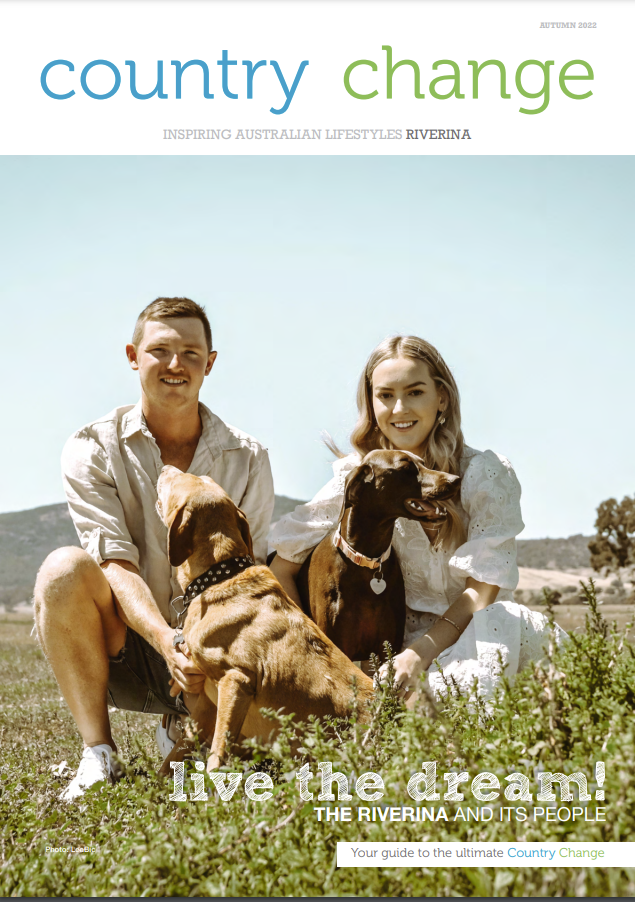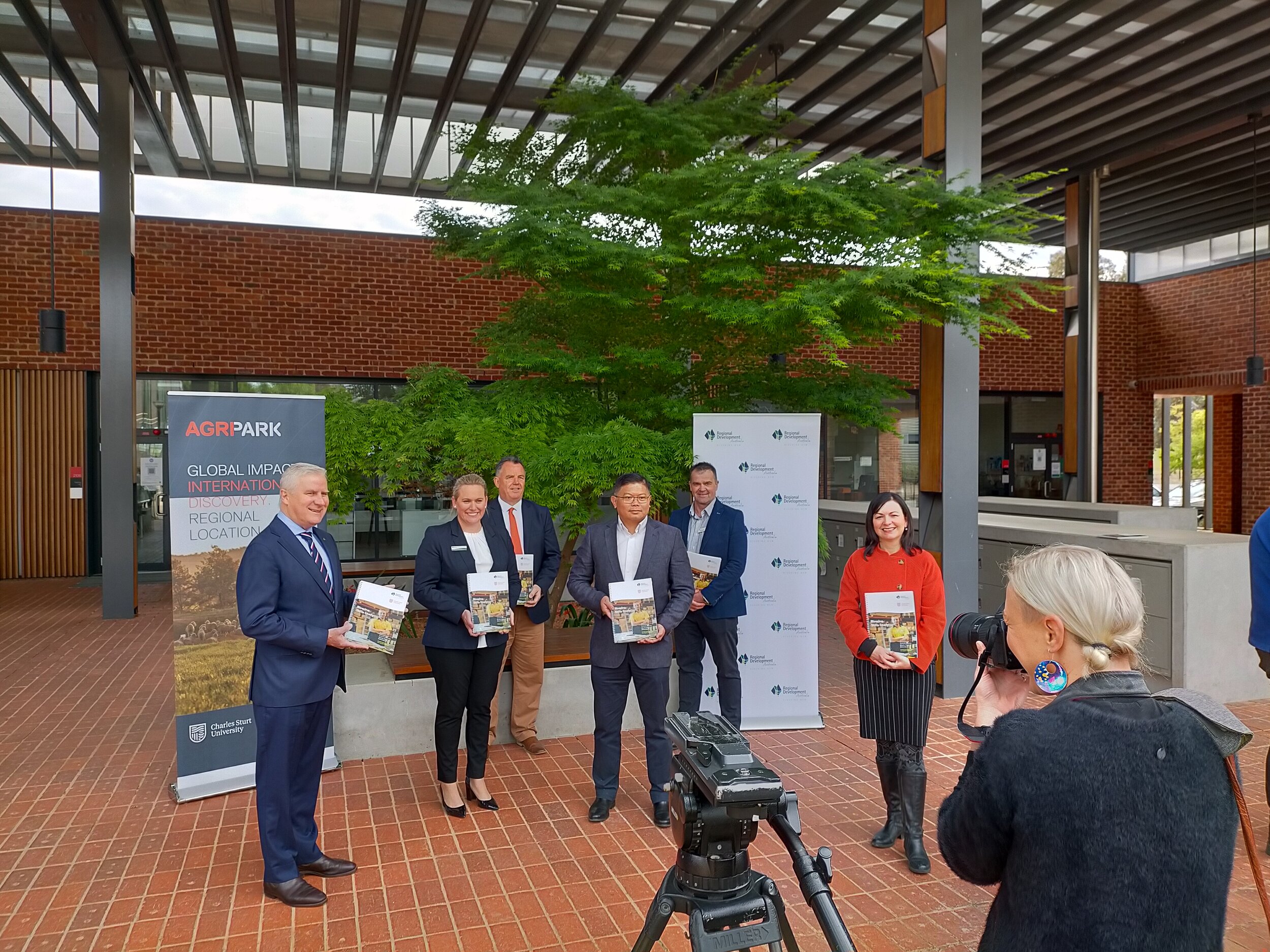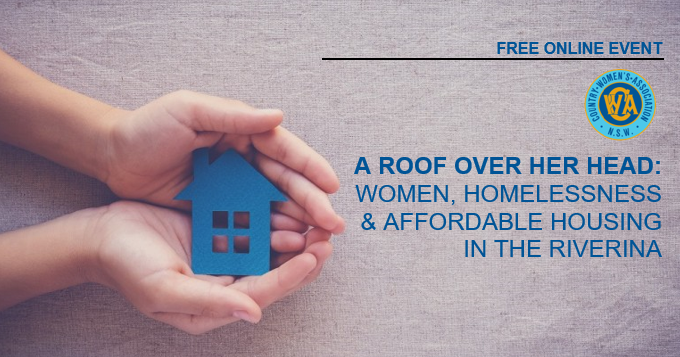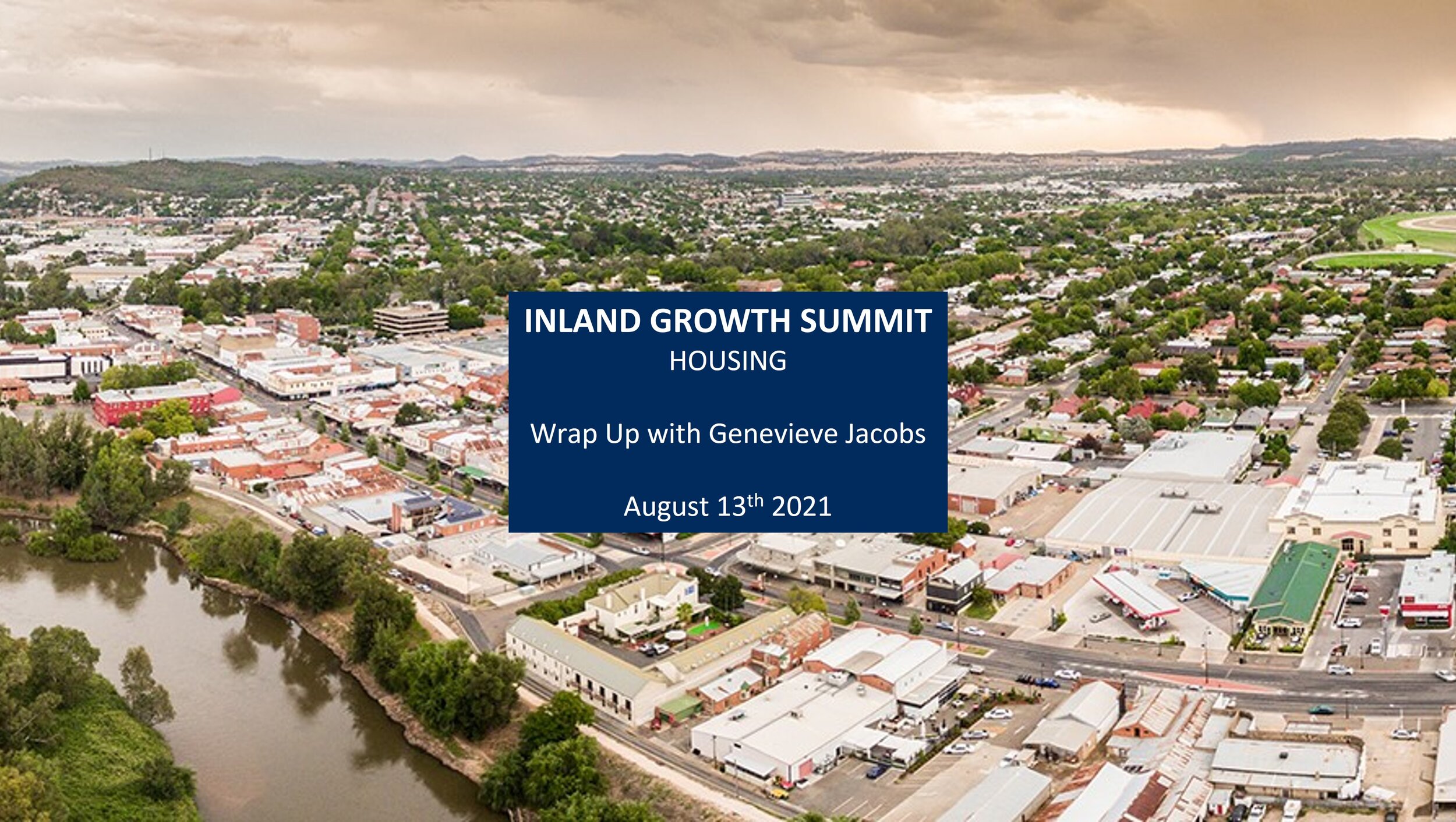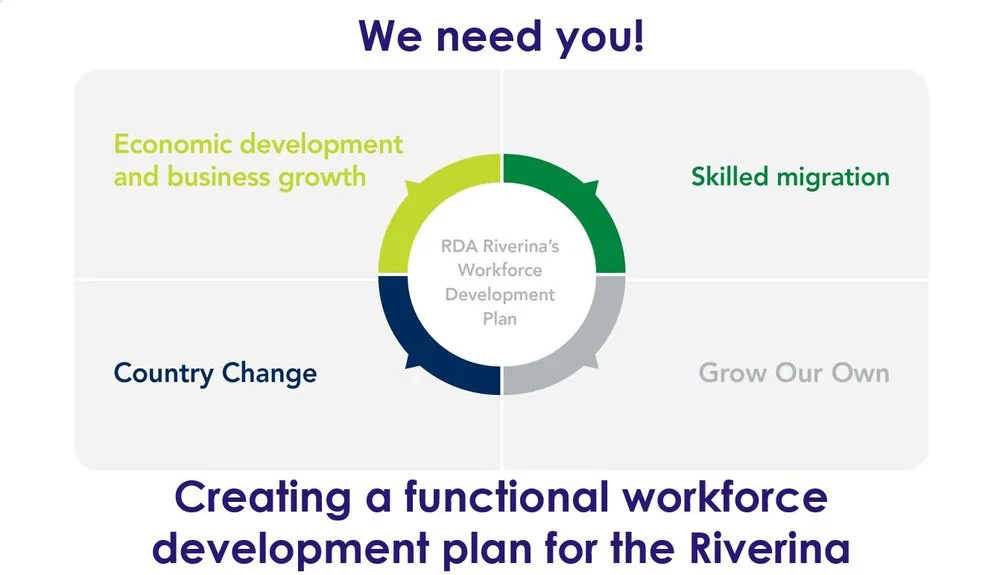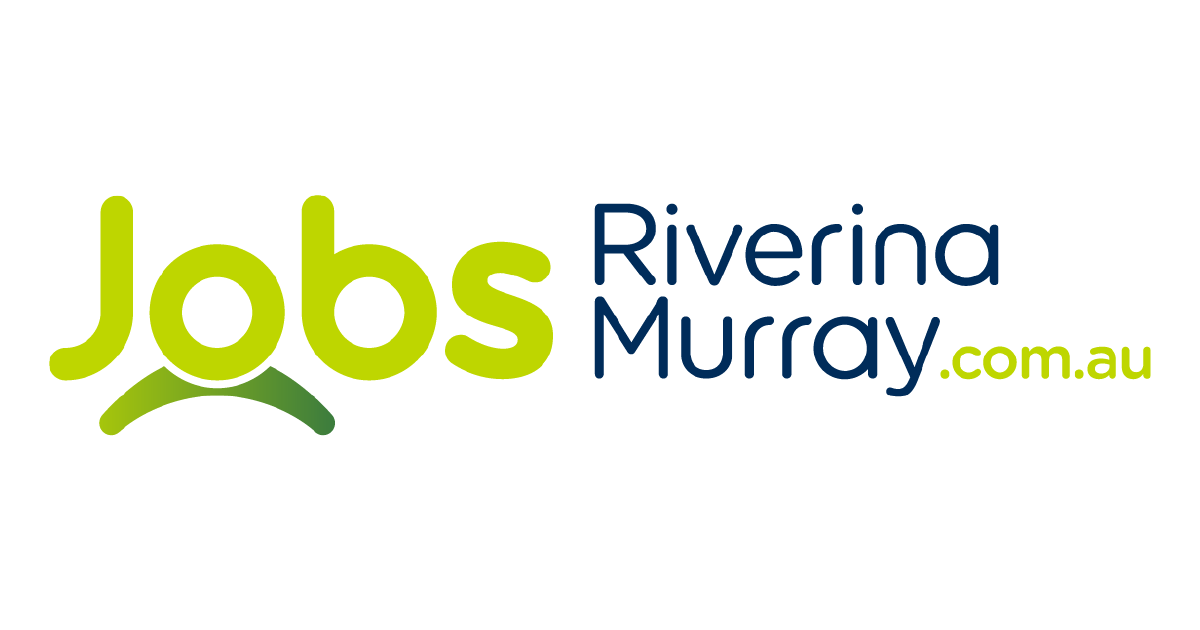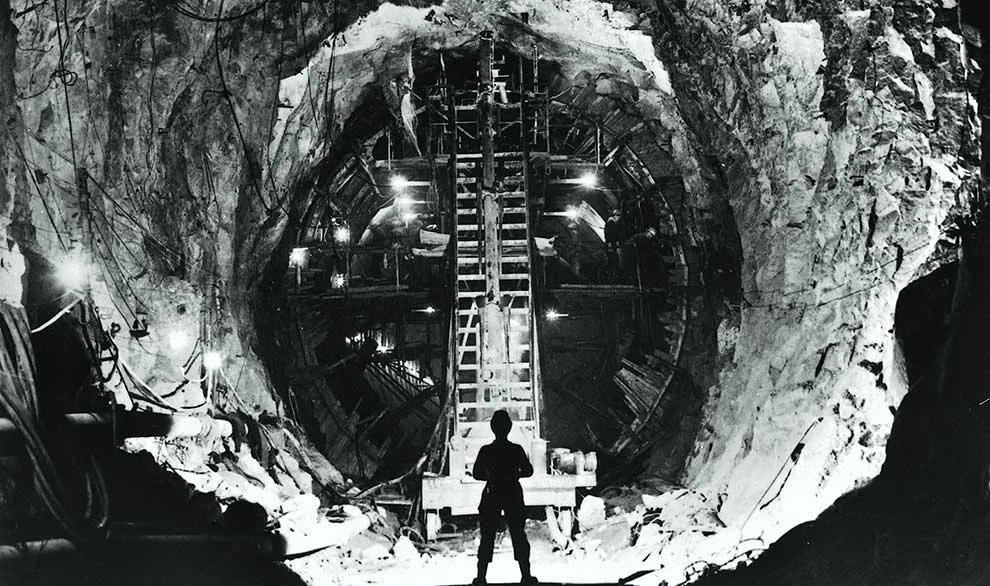Autumn 2022 Country Change Magazine Out Now!
The Autmun 2022 edition of the Country Change magazine is out now! The magazine showcases local Riverina tree changer experiences and promotes the key benefits of choosing this great region as a new home base.
The magazine showcases local Riverina tree changer experiences and promotes the key benefits of choosing this great region as a new home base.
The Autumn 2022 Country Change magazine is a collaborative publication under the Country Change campaign, led by Regional Development Australia (RDA), Riverina. The program raises awareness of the region to attract people looking for a country change and new opportunities in business.
As well as some heartwarming messages from locals, you will also read about business opportunities, development plans, housing estate releases and education and medical facilities available. What is clear is some of the main messages people from the cities are attracted to the Riverina is our lower housing costs and a more robust lifestyle and work/life balance.
“More than ever, people are reassessing their choice to live in cities. They want space, freedom and more connection and the Riverina offers that and much more,” said RDA Riverina’s Chief Executive Officer, Rachel Whiting.
Some of the main messages attracting people from the cities are lower housing costs, a more robust lifestyle and work/life balance.
“We know from research that 77% of country changers want a sense of more space. Another 77% wanted to connect with the natural environment and 75% were seeking overall improved wellbeing. Throw in the fast-growing business opportunities here and people see it as a ‘no brainer’,” said Ms Whiting.
For many potential tree changers, concerns about employment options can be front of mind. However, with a growing acceptance of remote working conditions many people are finding they can keep their jobs and still live the life they desire.
“A number of country changers have brought their jobs with them but there is also plenty of work right across the Riverina for those wishing to work locally,” said Ms Whiting. “There is also the potential to develop your own business with a supportive business network.”
2020-2021 Land Monitor Report
The land monitor report provides information to Wagga Wagga City Council about the current land releases in the LGA including available and projected land for housing development.
The Land Monitor report was first created by the HIA in 2013, now in its 8th year of production, it is a significant document for strategic planning in the city of Wagga Wagga.
RDA Riverina have been engaged to complete this work since 2020 in partnership with the HIA and Committee for Wagga.
The land monitor report’s purpose is to provide information to Wagga Wagga City Council about the current land releases in the LGA including available and projected land for housing development.
HIA and RDA Riverina presented the current data to council on Monday 14th March.
NSW & ACT RDA Prospectus
RDA Sydney have put together a prospectus highlighting the economic, social, and environmental strengths and opportunities of RDA regions across NSW and the ACT.
RDA Sydney have put together a prospectus highlighting the economic, social, and environmental strengths and opportunities of RDA regions across NSW and the ACT.
Download the prospectus and learn more about our regions!
Economic Impact of COVID-19 in the Riverina 2020-2021
RDA Riverina have put together a summary of some of the economic impacts of COVID-19 during the first two years of the pandemic.
Throughout 2020 and 2021 the Riverina was largely spared the worst of the pandemic. This has changed with the December 2021 wave, with the Riverina seeing it first significant levels of community transmission of COVID-19. The economic impact of this will not become apparent until further into 2022.
During 2020 and 2021, lockdowns, social distancing and vaccination played their part in protecting the region from the COVID-19. However lockdowns and social restrictions have had an effect on the local economy.
RDA Riverina have put together a summary of some of the economic impacts of COVID-19 during the first two years of the pandemic.
Economic Development Officer Forum – Temora November 2021
RDA Riverina, AusIndustry and Temora Shire Council partnered to present an update on economic development activities and trends across the Riverina.
RDA Riverina, AusIndustry, and Temora Shire Council partnered to present an update on economic development activities and trends across the Riverina. Guests presented on the topics of workforce, housing, opportunities to leverage business on major regional projects, climate impact, funding opportunities, and business innovation.
You can download and view each presentation below.
Riverina Skills Study Launch
The results of the Riverina Skills Study were released on Tuesday the 12th of October 2021 and show the extent of the skills shortage in the region.
Image: Launch of the Riverina Skills Study Tuesday 12th October 2021. L-R: The Hon Michael McCormack MP, Dianna Somerville (Chair of RDA Riverina), Dallas Tout (RDA Riverina Board), David Bardos (RDA Riverina Board), Ray Willis (RDA Riverina Board), Rachel Whiting (CEO & Director of Regional Development, RDA Riverina)
The results of the Riverina Skills Study were released on Tuesday the 12th of October 2021 and show the extent of the skills shortage in the region.
The study was conducted by Regional Development Australia (RDA) Riverina and was partially funded by Charles Sturt University’s AgriPark Seed Fund.
More than 164 survey respondents, eight focus group participants and seven interview participants provided feedback through surveys, focus groups and one-on-one interviews. The skills study aimed to understand what skills are in short supply, what future skills will be needed and collaborations necessary to deliver solutions to meet the projected growth of the region.
Charles Sturt Director of External Engagement in Wagga Wagga and Albury-Wodonga Samantha Beresford said the University was proud to be involved in an initiative that delivers an important assessment for the region. “The RDA has shown tremendous leadership in highlighting key issues and engaging industry and community in this important conversation,” she said. “As an anchor institute in the Riverina, it is important that the University has a deep understanding of how we can help address skills shortages and workforce development to ensure the prosperity and growth of this wonderful region.”
CEO and Director of Regional Development for RDA Riverina Rachel Whiting said the collaboration with the University provided a model to use with other regional universities. “We are very excited to be able to deliver the work that was conducted over the last two years,” she said. “This support (by Charles Sturt University) demonstrates the importance of the research presented in the Riverina Skills Study.”
This project is funded by the AgriPark Seed Fund.
For more information or to access a printed copy of the report please contact Rachel Whiting (ceo@rdariverina.org.au) or Melanie Renkin (research@rdariverina.org.au)
Image Description: Launch of the Riverina Skills Study. Pictured on the left is Samantha Beresford (Director, External Engagement, Wagga Wagga & Albury-Wodonga, Charles Sturt University) and on the right is Rachel Whiting (CEO and Director of Regional Development, RDA Riverina).
A Roof Over Her Head: Women, Homelessness and Affordable Housing in the Riverina
The A Roof Over Her Head: Women, Homelessness and Affordable Housing in the Riverina the online event hosted by the Country Women’s Association (CWA) Riverina Group was held on Wednesday 22 September.
The A Roof Over Her Head: Women, Homelessness and Affordable Housing in the Riverina the online event hosted by the Country Women’s Association (CWA) Riverina Group was held on Wednesday 22 September.
More than 80 people joined us via Zoom to listen to online to guest speakers Lynne Graham (Carevan Wagga Wagga Inc.), Wendy Middleton (Argyle Housing), Belinda McMahon (Sisters Housing Enterprises Inc.) and Dr Joe McGirr MP, Member for Wagga Wagga.
Watch the Recording
Share the Link
A recording of the online is available via the following link: https://youtu.be/LqU_pBHGgew. We encourage you to use this link to listen or listen again if you joined the conversation on Wednesday night. Most importantly, this link is available for you to share with your fellow CWA members, friends and colleagues and continue to raise awareness of the important issue of homelessness and the need for social and affordable housing in rural and regional NSW, and the solutions being provided by Carevan, Argyle Housing and Sisters Housing Enterprises.
Q&As
The answers to the questions raised by participants during the online event have been captured and answered by our guest speakers. Click below to download the Q&A document.
Make a Donation
Donations can be made direct to Carevan or Sisters Housing Enterprises by contacting the organisations.
Carevan
Email: carevanwagga@gmail.comSisters Housing Enterprises Inc.
Phone: 02 6291 6793
Email: info@sistershousing.org.au
Please note: Carevan is the current CWA Riverina Group Project. A number of Branches have already made a donation to Carevan. However, Branches which have not yet made a donation may wish to do so by contacting Lynne Grahame at Carevan using the above email address.
Find Out More
Visit the organisation’s websites for more information about what they do:
Sisters Housing Enterprises Inc.
Thank you for your support.
Feedback
RDA Riverina supported this event as part of our capacity building to local community organisations
NSW Growing Regions of Welcome Pilot Program
The three-year NSW Growing Regions of Welcome (NSW GROW) pilot program aims to strengthen regional community capability to attract and retain newcomers and assist with relocation to the Riverina and Murray areas.
Monique Lerchner, NSW GROW Backbone Coordinator
The three-year NSW Growing Regions of Welcome (NSW GROW) pilot program aims to strengthen regional community capability to attract and retain newcomers and assist with relocation to the Riverina and Murray areas.
The NSW Coordinator General for Settlement, Professor Peter Shergold says NSW GROW reflects the strong cross-sector relationships across all levels of government, community, and industry to support successful settlement and strong NSW communities.
“This program will address critical workforce needs in regional NSW that would usually be filled through overseas migration.“
“NSW GROW will support coordinated efforts across sectors to create secondary migration linkages between western Sydney and regional NSW and drive sustainable social and economic outcomes for participating regional communities and newcomers alike.”
In western Sydney, a Regional Employment Hub will provide a gateway for interested western Sydney-based newcomers to connect with identified opportunities in the regions.
Backbone coordinators in both locations will support the design and implementation of plans to attract and retain people arriving from western Sydney.
In the Riverina, Regional Development Australia (RDA) Riverina have employed Monique Lerchner in the Backbone Coordinator role.
Building on the past 12 months of work by Faye Anderson (Migrant Economic Partnership Coordinator), Monique will work with Multicultural NSW and the Red Cross to resettle newcomers from Western Sydney into the region to meet the economic and social needs of the local LGAs and communities. While disruptions due to COVID-19 are still occurring Monique will facilitate introductions between local businesses facing staff shortages with local migrants who are already in the region and open to new job opportunities.
Rachel Whiting, the CEO of RDA Riverina says the level of job vacancy advertisements in the Riverina has reached a 10-year high. “We have more jobs than people in the Riverina. NSW GROW is another strategy to contribute to RDA Riverina’s workforce development plan for the region. We know our communities are welcoming of newcomers, and we look forward to working with LGAs like Leeton and Temora Shires to welcome more people and match them with employers’ needs.” Multicultural NSW received $3 million funding from Training Services NSW to deliver the pilot program. For more information about Multicultural NSW, please visit: www.multicultural.nsw.gov.au.
Project Energy Connect - Supply Chain Opportunities Presentations
Find out about the upcoming supply chain opportunities with SecureEnergy. SecureEnergy is a joint venture between Clough and Elecnor, two global leaders with local knowledge in delivering engineering, procurement and construction projects for the power infrastructure industry.
Regional Development Australia organisations are connectors. RDAs are NFP non-government organisations who work to deliver economic development in 53 regions around Australia. We have voluntary Boards with local people passionate about the region and Chairs who are appointed by Minister Nola Marino. Minister Marino has set an energetic tone and focussed RDAs on developing local procurement opportunities, jobs and investment.
RDA Murray and Riverina have great track records bringing people together to facilitate community, business and industry development to bring more investment into the region from the Snowys to the SA Border. We each have specific workforce and local procurement initiatives and would be pleased to discuss your needs and ideas to make the most of this project in our region.
Energy Connect is a Nationally Significant Project with 100s of millions of dollars being invested in infrastructure in our region which will enable the growing use of renewable energy across Australia. We are committed to you to ensure our region benefits as much as possible from this investment.
SecureEnergy is a joint venture between Clough and Elecnor, two global leaders with local knowledge in delivering engineering, procurement and construction projects for the power infrastructure industry. SecureEnergy on behalf of TransGrid will build EnergyConnect, a 700km overhead electricity transmission line and one of the nation’s largest energy infrastructure projects.
Find out more about the upcoming supply chain opportunities in the presentations below.
Each of the three videos contains the same presentation followed by a question and answer session. The questions answered in each session are different. Please feel welcome to contact Rachel Whiting on 0429 444 213 and ceo@rdariverina.org.au at Regional Development Australia Riverina or Edwina Hayes at Regional Development Australia Murray on 0427 267 753 and edwina.hayes@rdamurray.org.au . You can find us on social media under our names and “Regional Development Australia” Murray or Riverina
Contact Geoff Reardon of Industry Capability Network NSW on 0402 632 027 and greardon@ICNNSW.org.au to understand the opportunities that may be available along with assistance with setting up your ICN Gateway profile and submitting your expression of interest, or go to secureenergyjv.com.au for further information about the work and potential supplier opportunities.
August 25th Morning Presentation - Q&A session begins at 45 minutes and 30 seconds.
August 25th Evening Presentation - Q&A session begins at 41 minutes.
August 26th Morning Presentation - Q&A session begins at 45 minutes and 35 seconds.
Inland Growth Summit Housing 2021
RDA Riverina teamed up with RDA Orana to host the fourth Inland Growth Summit with a focus on housing. The summit was held on the 13th of August 2021 with excellent speakers and fantastic attendance.
Here is the recap if you missed out.
Recap of our Inland Growth Summit - Housing 2021
RDA Riverina teamed up with RDA Orana to host the fourth Inland Growth Summit, with a focus on Housing.
Official opening
Demographic changes, regional growth, employment demand, and multiple other factors have collided to create a really stressful situation in a number of inland communities. The Hon Mark Coulton MP pointed out at the beginning of the day, not long ago communities were offering farmhouses for peppercorn rents, desperate to get people into some areas of regional New South Wales. Now, the focus is so strongly on people moving to the regions. So, we do need some innovative solutions. Assistant Minister for Regional Development and Territories, the Hon Nola Marino MP set the scene supporting a collective response across all levels of government. She reminded us that mateship and collaboration are very much in our DNA as regional Australians and asked us as a collective to leverage that.
It's particularly important when, as we've heard a number of times during the day, we've got a multi-billion dollar infrastructure spend coming down the pipeline that will be of enormous benefit, but we'll also continue to put real pressure on housing. NSW Minister for Housing, the Hon Melinda Pavey MP also noted that this is essentially a positive issue in many respects, but one that requires flexible solutions. Among them, the New South Wales government has identified and indexed all the crown land that's available, all 250,000 parcels of it. And that includes land where zoning could be changed.
The site where you can find that is: https://pp.planningportal.nsw.gov.au/government-property-index-list
Session 1
Peta Gilhome from Domain, presented some really interesting data, pointing out that COVID and housing had this fascinating effect where the market remains extremely strong in many areas and COVID could be a generational change for housing and regional community growth. It is a real change in housing pressures in inland New South Wales, particularly because current workforce trends are really enabling dispersed work patterns. And that's not just the high profile coastal destinations, but also the major regional centres. She pointed out that "rivers outrank beaches", which is good news for many of us and that in-depth data she was able to access about who's moving where and why and from where. Data that many of you identified as very valuable.
Neil Barber, from the Australian Red Cross, pointed out the positive economic influence of migration and that migration to the regions is not disconnected from urban migration patterns. Much regional migration is still temporary, but there are ways to harness it for regional benefit. Large migration clusters in major cities do stress services. So, there's a push to bring migrants into regional areas and to keep them there. That's problematic in some ways as there's a risk of exploitation with some private rental arrangements, particularly given it can be very tough for refugees and migrants to access employment, but there's an opportunity for some lateral thinking around incentives. If we can work together across government and private providers to meet their needs and to acknowledge that for migrants and refugees, smaller communities, places like Temora and Leighton and Walla Walla the shift could be quite appealing for some families in that cohort.
Julie Briggs also talked to us about a flexible local approach to solving these problems. It was astonishing to hear that in some communities there is not a single house to rent. And with that billions of dollars in infrastructure investment on its way, the lack of housing can be a handbrake on growth. So, how do we unlock land that's zoned for housing, but not being developed? Julie suggested possibly a revolving infrastructure fund that recognized the upfront costs of things like water and electricity and sewage, which also has a long lead time. She also suggested that the State Government could work via local government with developers so that repayments could be made as sales.
Our final speaker of the session, Dr Kim Houghton, from RAI talked to us about some of the key economic drivers in this situation of pent up demand, regional growth driven by prices that were originally significantly lower than the urban centres, demographic trends that are bringing cashed-up urban people to the regions and putting pressure on the locals. And he said, importantly that many more people are choosing to stay in the regions and that's driving historically low availability in many areas. Well below the long-term average, rentals are tied up for new arrivals. There is on the positive side, a record level of building approvals. Although, we don't have good data on what investors are doing in the regions. It will all take time to flow through and mend that supply issue. But Kim warned us that population predictions have often been on the low side. So, we need to just be conscious of those growth scenarios, particularly in our larger centres.
Session 2
Session two was on ideas and solutions. Mike Day talked to us about the art of timeless town planning and the neighbourhood unit. He seeded the idea of affordable living versus affordable housing and pointed out that well-designed neighbourhoods can actually be cheaper to live in. They reduce transport costs, they reduce heating costs. It's quite old fashioned thinking in many ways about what makes people feel comfortable and connected and at home, really simple things: the north face in courtyards, good street frontages, pleasant well-designed spaces, even if they're small, and the idea of walkable neighbourhoods (living 20 minutes from anywhere).
Brendan Grylls also gave us a really powerful presentation on housing pressures and warned us about what had happened in the Pilbara. Massive mining-led growth as a template for what we're experiencing and perhaps what we need to avoid. So, social housing models might be well-established, but where do we go beyond that for workers? How do we avoid those damaging boom and bust cycles for service workers? And the answer in the Pilbara was the service worker housing program where rents could be managed separately to the market. Brendan also introduced the concept of lifestyle villages for service workers. Brendan made the powerful point that the market wasn't normal and when that happens, it doesn't attract normal levels of investments. So, it requires robust policy approaches to ensure that we don't lose service workers via a completely unfettered housing market.
Peter Vlatko, General Manager of Cobar Shire Council talked about issues around employer engagement in growth issues. Large employers and projects want the people, but they're not so invested in ensuring that they remain in communities. He pointed to difficult social issues where the miners are welcomed, whether they become part of the community, social and economic structure. And if miners are flying in or flying out or busing or busing out, that doesn't happen. So, local governments need to work really hard to try to bring those people into the community without developing mining camps.
Session 3
In our Innovations Session, Tom O'Dea from the NBN talked to us about digital infrastructure, now recognized as critical as roads and water. The potential upgrade paths are evolving constantly, including the sky muster satellite. And again, we heard about a huge amount of network investment, $4.5 billion worth of it coming to enable more Australians to access higher speed. He says 75% of people in fixed-line networks should be able to do so. We could all have an average of up to 30 connected devices in our homes in the next decade. So, it's critical for business, but a strong personal expectation for building regional communities.
Nick Lane told us that it takes around three years for people to fully settle into their new communities. And he pointed to the need for available transition housing so that people who do come to the regions can build relationships and decide to stay. It takes a long time, he said, to meet the rising demand, but coupled with that is a sustained infrastructure boom that gives us huge opportunities for social and economic uplift. Riverina alone has many, many millions of dollars in the infrastructure pipeline with more than 7,000 jobs attached to it and that needs capacity. There need to be workers to build everything that's associated with that infrastructure. If we're without the capacity, we miss out on opportunities, we create stressful and difficult situations for the existing workforce and reminding ourselves that existing regional populations are aging. So, let's not repeat the mining boom issues that are so well outlined by Brendan and Peter. We need housing to be a critical factor in the planning processes as the boom gathers speed.
Catherine Brazier talked to us about efficient environmentally sustainable opportunities for well-designed prefabricated homes, not what you would have thought of in the past. We're talking construction on steel frames with double glazing insulation, so much more attractive as an option. And it also responds to the skill shortage we've been hearing about. It's a small part of the construction industry, but growing fast with plenty of opportunities for not just houses, but also other sustainable buildings and facilities for communities.
And we also heard from Tony Balding about the possibilities for resilient housing that meets particular needs but is well-made and it's efficient, particularly for people who've been through disasters. He mentioned an eight-hour install with building methods for a house, plus a granny flat, painters inside within weeks. The capacity for adaption to extreme fire zones, meeting insurance requirements, and that in turn makes refinancing and rebuilding for disaster recovery more possible.
Session 4
Our final session was challenging the norm. We started with Garry Fielding, who talked to us about the search for solutions within the New South Wales planning system, including identifying the issues and trends in regional communities. The act of search for solutions for greater housing choice, supply, and affordability are being identified in regional New South Wales. We expect that report in October this year, but Gary said the impact of very little rental availability is abundantly clear in many regional areas. Housing stress and the following pressures are growing rapidly. And that includes social pressures too. Where do you find social housing, for example? Where do you find crisis accommodation in this demand heavy market, especially when the pipeline is slow to respond? And added to this there is the issue around the stock itself, is unlocking new sites always the answer? Not necessarily.
David Fisher, CEO of Housing Plus also stressed to us just recently how difficult this all becomes when there are 1.4 million people in some form of housing stress right now, and by affordable housing, he means housing 20% below the market average. Where then do we put people who need refuge? People, who need emergency accommodation? He pointed out that community housing providers are charitable. They don't pay GST or land tax or stamp duty. So, collaborating with them regarding community housing makes it possible to achieve good solutions for your community efficiently and effectively. There are 50,000 people on the waiting list and growing, nothing will be solved by a single agency, but that collaboration with community housing providers does mean that there are economic benefits and that's in construction, in securing workforce, in all the issues that we've been talking about.
Brett Stonestreet, GM of Griffith City Council and Justin Nyholm, CEO of Argyle Housing talked about how effective those collaborative approaches can be and also the lessons learned. Among them, the need for really extensive community consultation, understanding what the community values, which might be unexpected, perhaps not what you would have thought it would be, but we also saw the picture of what long-term close collaboration can achieve. Our final speaker, Jenny Mattila talked about the time required to solve the housing issue, with fast grants and quick politics not being able to budge deep-seated complex housing issues.
Rewatch the presentations below
Wrap Up with Genevieve Jacobs
Session 1
Session 2
Session 3
Session 4
Our Speakers
Minister Melinda Pavey
Melinda Pavey is the New South Wales Minister for Water, Property and Housing, appointed in April 2019 under the Berejiklian-Barilaro Government. Minister Pavey has been a member of the New South Wales Legislative Assembly since 2015, representing the seat of Oxley for The Nationals. Melinda previously served as the Minister for Roads, Maritime and Freight. (2017-2019) and was the first woman to hold this Ministerial position. She was a member of the New South Wales Legislative Council (2002-2015). She also served as the Shadow spokesperson for Emergency Services and the Parliamentary Secretary for Regional Health. Melinda grew up on a dairy farm in regional Victoria. She has two children and enjoys surf lifesaving, netball and bike riding. As a country girl, Melinda is passionate about advocating for rural communities and issues that matter to families across the state.
Justin Nyholm
Acting CEO & Property and Asset Services Manager. Justin has over 30 years’ experience in the building and civil construction and maintenance sectors. This experience has been with Corporate, State & Local Government and the Not for Profit Sectors. Justin experience ranges from residential, industrial, public infrastructure and air transport facilities. In his 3 years with Argyle Housing, Justin has delivered many housing projects and worked closely with the NSW State Government, Councils and other CHP’s to progress major Social and Affordable Housing opportunities in regional areas.
Genevieve Jacobs (MC)
Genevieve Jacobs is the Group Editor for Region Media, Australia's fastest growing digital news platform. Genevieve chairs the ACT arts minister's Creative Advisory Council and co-chairs the ACT Reconciliation Council. She sits on the boards of the Cultural Facilities Corporation, the National Folk Festival and is deputy chair of the Canberra International Music Festival. She is also a director of the Conflict Resolution Service and the Australian Centre for Christianity and Culture. She was made an AM in the Australia Day honours list for her service to public broadcasting and the community. Genevieve has an enduring interest in building community engagement and is a partner in the family farming enterprise.
Brett Stonestreet
Brett Stonestreet was appointed as Griffith City Council's General Manager in August 2011. Brett has over 40 years of experience in local government and has spent a significant period of that time as a CEO, Group Manager and General Manager in Moyne Shire (Victoria), Gunnedah Shire, Cobar Shire and Barraba Shire Councils. Brett holds a Bachelor of Business Degree (Local Government).
Dr Kim Houghton
Dr Kim Houghton is Chief Economist at the Regional Australia Institute. Kim manages the Institute’s policy and research portfolio to ensure that the work has practical application and supports a better policy environment and more vibrant regional economies. Kim has played a leading role in recent research on population mobility in regional Australia, analysis of regional labour markets, and the impact of COVID-19 restrictions on regional economies.
Mike Day
A co-founder and partner at HATCH | Roberts Day, Mike has moderated visioning + planning design forums and led the firm’s design teams responsible for an array of urban renewal projects and new towns throughout Australia, New Zealand, UAE and Asia since the inception of the company in 1993.Based in Melbourne since 2005, Mike is leading the practice's design teams implementing new towns and urban renewal projects. Mike has held many positions as chair and deputy chair of planning committees in Western Australia and Victoria. Mike was the recipient of the 2018 Place Leaders Asia Pacific Centrepiece Award | Leadership Excellence in Promoting Walkable Urbanism.Mike is a Fellow of the Planning Institute of Australia and a Fellow of the Australian Institute of Company Directors.
Cr Greg Conkey OAM
Greg Conkey is an awarding-winning journalist and talented photographer who has had more than 30 years of experience working in rural and regional Australia. For 26 years he edited and managed The Riverina Leader newspaper in Wagga Wagga. In 2005 Mr Conkey started his own public relations and media consultancy (Greg Conkey and Associates) drawing on his extensive media background and project work for numerous humanitarian causes. In January 2012 Mr Conkey was awarded an Order of Australia Medal for services to the Wagga Wagga community. Later that year he was elected as a City of Wagga Wagga Councillor and four years later was elected unopposed as Mayor. He was re-elected as Mayor in 2018 and again in 2020.
Neil Barber
Neil Barber manages Australian Red Cross Migration Support programs in South Western NSW, including the large residential accommodation program for Humanitarian settlement in Albury and Wagga Wagga - which involves coordination of an average 100 property leases at any one time across both cities as well as short term accommodation and responses to homelessness. Neil has a long association with social and community development in south-western NSW over the past 25 years and has a strong understanding of the capacities and barriers in relation to regional migration and settlement.
Peta Gilhome
Experienced Regional Account Manager highly skilled in Digital Strategy, Sales, Key Account Development, Business Development, and Marketing Strategy. With a passion for Regional NSW and Real Estate - building symbiotic relationships, connecting people and encouraging collaboration to grow our regional real estate industry. Strong sales professional with a Diploma of Business Management - Marketing focused in Business, Management, Marketing, and Related Support Services.
Julie Briggs
The principal of JBMS Consulting, She has worked with business and government for over twenty-five years. Since September of 1997 JBMS Consulting has provided CEO services to the Riverina Eastern Regional Organisation of Councils (REROC). A voluntary association of 8 Local Governments located in the eastern Riverina region of NSW. Julie's main role is to identify, initiate and implement projects that increase the efficiency and effectiveness of local government through collaboration.
Julie has been working with the REROC Member Councils and the Members of the Riverina Joint Organisation along with NSW Government Agencies, RDA Riverina and industry stakeholders on the development of a Regional Housing Strategy for the eastern Riverina.
David Fisher
David has been CEO of Housing Plus since 2016, where he has been championing the need for additional community services and more affordable housing across the Central and Far West regions of NSW. David is passionate about community based organisations, provision of opportunities and choice to tenants and developing the culture and impact of the organisation that he leads.
David is Vice Chair of the Homelessness NSW and President of NCOSS Boards and seeks to provide a regional perspective to these organisations.
Jenni Mattila
Civitas Solutions Australia assists local government and their local communities to establish owner occupied housing co-operatives around Australia.
Civitas Solutions Australia works with local governments, banks and housing co-operatives to assist with finance for affordable housing not just in major cities but also in regional Australia where quality housing is in short supply.
Peter Vlatko
Commenced in Local Government as a trainee Accountant back in 1976 and worked in both South Australia and NSW Councils and currently the GM in Cobar for over 5 years.
Catherine Brasier
Catherine is Sales Manager at Prefabulous. Catherine has a background in Hotel Management, Wine Industry and Property. While the wine was great, for the past 15 years her focus has been on property development and sales for new projects in the retirement living and real estate sector. As a self-confessed 'modular home' nerd Catherine loves a design challenge with plenty of personal building experience. But more than anything Catherine is passionate about your Prefabulous journey and how you can experience the best of what we offer.
Garry Fielding
Qualified town planner with over 40 years experience in State and local government and the private sector. Worked at senior executive levels with the NSW Department of Planning and also as head planner with Newcastle, Woollahra and Maitland councils. Life Fellow and former NSW President of the Planning Institute of Australia
State-appointed Chair of the Western Regional Planning Panel.
Nick Lane
Nick focusses on developing business systems that deliver whole of community impact and uplift and has created a community development model to assist regional communities to tackle some of the critical issues that are facing them such as housing supply, population growth, skills, training, and employment pathways. In tackling the housing market failure that is constraining many regional cities and towns, he brings 20 year’s experience in innovation, complex systems management, project delivery, and development. He is also passionate about sustainable communities, collective impact, and placemaking. He is the co-founder for PassivePlace and Shift Regional, providing employment and housing solutions for regional Australia, and has extensive engagement and project experience in regional communities both here and overseas.
Brendan Grylls
Few people can bring 20 years of successful policy development and implementation in Northern Australia to the table, with an ongoing commitment to grow and develop the mining towns and cities of Northern Australia. Brendon Grylls, former politician, architect of the transformational Royalties for Regions program in Western Australia and now successful Pilbara based Managing Director of BGG has a track record of building policy platforms from - ‘that will never happen’ - to ‘how did that happen’?! Grylls has built a new life in the Pilbara after politics and is relishing utilising his skill set in assisting business in the corporate and small business sectors, in the vast Northwest where so many opportunities abound. He has established Brendon Grylls Group, providing strategy and business development advice to a diverse client base including agriculture, beef, aviation, indigenous corporations and the resource sector.
Tony Balding
Managing Director of: The Building Supply Company, Buildpro Wagga , National tiles Wagga, lighting network Riverina, and Accelerated housing Company Pty Ltd. and recently divested business in Canberra building innovation centre. Currently Chairperson for the Riverina branch of the HIA a position held for 13 of the 18 years the branch has been reformed. Regional executive representative for ACT/Southern NSW HIA Board member of The Forrest centre Age care facilities. Life member of Apex Australia. Inductee into the HIA Riverina honor roll for Building Industry 2018. Strong focus on developing better ways of construction having been exposed to most if not all building systems over 40 years in residential, commercial and renovations. Having had the privilege to represent small to medium size builders on the board of HIA I have had exposure to many of the challenges in the industry from design, legislation, bureaucracy, and market trends.
Workforce Development Plan
Creating a functional workforce development plan for the Riverina
RDA Riverina’s workforce development plan consists of:
Economic Development and Business Growth: working with business where we can to make a difference. RDA Riverina’s accelerator program is a prime example of how we can do this. Likewise our service offering through our Riverina Regional Profile, Economic Impact Analysis, Investment Profile and grants assistance.
Skilled Migration: RDA Riverina is a Regional Certifying Body for Skilled Regional (Provisional) Visa (Subclass 491) or the Employer Nominated Regional Sponsored Migration Scheme (Subclass 494) visa.
Country Change: Encouraging people to move to the Riverina for work, education and recreation.
Grow Our Own: Encouraging young people to find career pathways and education whilst staying in the Riverina.
The workforce development plan is supported by the JobsRiverina page. JobsRiverina is a free resource for employers and job seekers in the Riverina Region.
Visit the JobsRiverina page at www.jobsriverina.com.au
Skilled Migration Success Stories
Regional Development Australia Riverina is pleased to announce the publication of a booklet of Skilled Migration Success Stories.
Regional Development Australia Riverina is pleased to announce the publication of a booklet of Skilled Migration Success Stories.
The booklet showcases the stories of six skilled migrants who relocated to the Riverina area as a result of the Skilled Migration nomination program administered by RDA Riverina.
2019-2020 Land Monitor Report
Committee for Wagga, HIA and Regional Development Australia-Riverina have released the 2019-2020 edition of the Land Monitor Report.
Committee for Wagga, HIA and Regional Development Australia-Riverina have released the 2019-2020 edition of the Land Monitor Report.
This document enables stakeholders to make better informed decisions relating to market demand and future economic growth. This report has been provided to help ensure that there is a sufficient supply and choice of vacant land in the future.
Migrant Workforce Survey
RDA Riverina are conducting a study focusing on identifying and engaging migrants and refugees already living in the Riverina. The first stage of this study is a survey.
Migrant Workforce Survey
RDA Riverina are leading a study that will collect information about, and work with, migrants and refugees already living in the Riverina. The first stage of this study is a survey.
If you are a migrant or refugee living in the Riverina, we would love you to complete our survey. You do not need to do this, but completing the survey will help us to understand more about the help you need to find suitable work in the Riverina and settle well into our community.
This work is funded by Multicultural NSW as part of a three-year Regional Resettlement program in the Riverina region of NSW with a focus on creating linkages and pathways between the migrant and refugee workforce, employers, industry and relevant training and support providers.
If you would like more information regarding this project or this survey please phone us on (02) 5924 5861 or email us at migration@rdariverina.org.au.
Building Better Regions Round 5
The Building Better Regions Funding Round 5 closes on 5th March, with applicants urged to engage with their local RDA before submitting an application.
The Building Better Regions Funding Round 5 closes on 5th March, with applicants urged to engage with their local RDA before submitting an application.
Applications for BBRF Round 5 can be submitted through the online portal at www.business.gov.au/bbrf .
Applications close on 5 March 2021, with successful applicants expected to be announced in mid-2021.
This round of funding includes $100 million in dedicated funding for tourism-related infrastructure and
$100 million for broader community infrastructure and investment.
It is strongly suggested that applicants engage with their RDA before submission of an application.
Click below to view a presentation for more information on this round:
Country Change 2020 Magazine
Launched in September 2020, the Country Change 2020 Magazine showcases 10 Riverina Council areas including Coolamon, Cootamundra-Gundagai, Greater Hume, Griffith, Leeton, Lockhart, Narrandera, Snowy Valleys, Temora and Wagga Wagga.
Launched in September 2020, the Country Change 2020 Magazine showcases 10 Riverina Council areas including Coolamon, Cootamundra-Gundagai, Greater Hume, Griffith, Leeton, Lockhart, Narrandera, Snowy Valleys, Temora and Wagga Wagga.
The magazine was launched by Member for Riverina and Deputy Prime Minister the Hon Michael McCormack MP in Wagga Wagga.
Featuring personal stories from people who have relocated to the Riverina, information on the Indigenous history of the region, along with housing, employment and education articles, the magazine provides a guide to the ultimate Country Change.
You can download the magazine here:
Riverina Skills Audit - Phase 2
We are looking for business owners and recruitment managers from businesses and organisations across the Riverina in any industry to participate in phase two of our research.
Earlier this year we began the first phase of our Riverina Skills Audit with a survey. We had a great response to the survey and received important information that we need to understand the skills needs of employers in our region.
We are now at the second phase of this work. This will be a series of focus groups and interviews with members of the business community in the Riverina. We are now recruiting additional participants for these focus groups.
We are looking for business owners and recruitment managers from businesses and organisations across the Riverina in any industry. These focus groups will take about 1 hour of your time and will be conducted online.
Riverina Skills Audit
RDA Riverina in partnership with Charles Sturt University have put together a survey to collect crucial data into skills shortages in the Riverina. We invite business owners and recruitment managers of businesses and organisations in the Riverina to complete this survey.
Riverina Skills Audit
Understanding the skills needs of employers and other issues they encounter when trying to find workers is vital to the prosperity of the region but, until now, quantitative data has been lacking.
To better understand these issues, Regional Development Australia (RDA) Riverina in partnership with Charles Sturt University is conducting research to identify skills shortages in the Riverina.
This research will be composed of two phases. The first is currently under way. RDA Riverina and CSU have put together a survey to collect crucial data into skills shortages in the Riverina. The second phase of this research will come later in the year.
We invite business owners and recruitment managers of businesses and organisations in the Riverina to complete this survey. It will take around 10 minutes to complete.
This project is funded by the AgriPark Seed Fund.
For more information please contact Rachel Whiting (ceo@rdariverina.org.au) or Melanie Renkin (research@rdariverina.org.au)
Jobs Riverina Murray
Jobs Riverina Murray is a free resource for employers and job seekers in the Riverina-Murray Region.
JobsRiverinaMurray is a free resource for employers and job seekers in the Riverina-Murray Region.
JobsRiverinaMurray is a one-stop-portal allowing job seekers to easily find work opportunities and apply online. It also gives employers a cost-free way to expand their recruitment activities to an audience specifically interested in working in the region.
Snowy 2.0 - Register with ICN Now!
Snowy Hydro expects Snowy 2.0 to create a range of business opportunities in the local region. Business capability registrations are now open on ICN.
Registrations close 4th November 2019
Register your business capabilities for available work packages
Snowy Hydro expects Snowy 2.0 to create a range of business opportunities in the local region.
Snowy Hydro's principal contractor for Snowy 2.0 is the Future Generation Joint Venture, a partnership between Australian construction and engineering company, Clough, with global hydropower and tunnelling specialists, Salini Impregilo, as well as Lane Construction..
Future Generation is managing the project’s procurement, specialist subcontracting and workforce requirements.
Opportunities exist in the following work packages:
Accomodation and Housing
Civil Works and Plant Hire
Concrete and Formwork
Cranes and Cranage Services
Education and Training
Electrical Trades and Services
Environmental and Rehabilitation Services
Fabrication and Engineering Services
Fencing and Landscaping
Fuel and Power
Haulage and Cartage Services
Health and Safety Services and Supplies
IT Services and Data Networks
Light Vehicle Servicing and Parts
OEMs and Industrial Supply Items
Plumbing and Sewerage
Quarry Products
Residential and Commercial Builders
Retail Food and Beverages
Scaffolding Supply and Installation
Steel and Structures
Surveying Design and Estimation
Waste Management
Supplier Development Program

